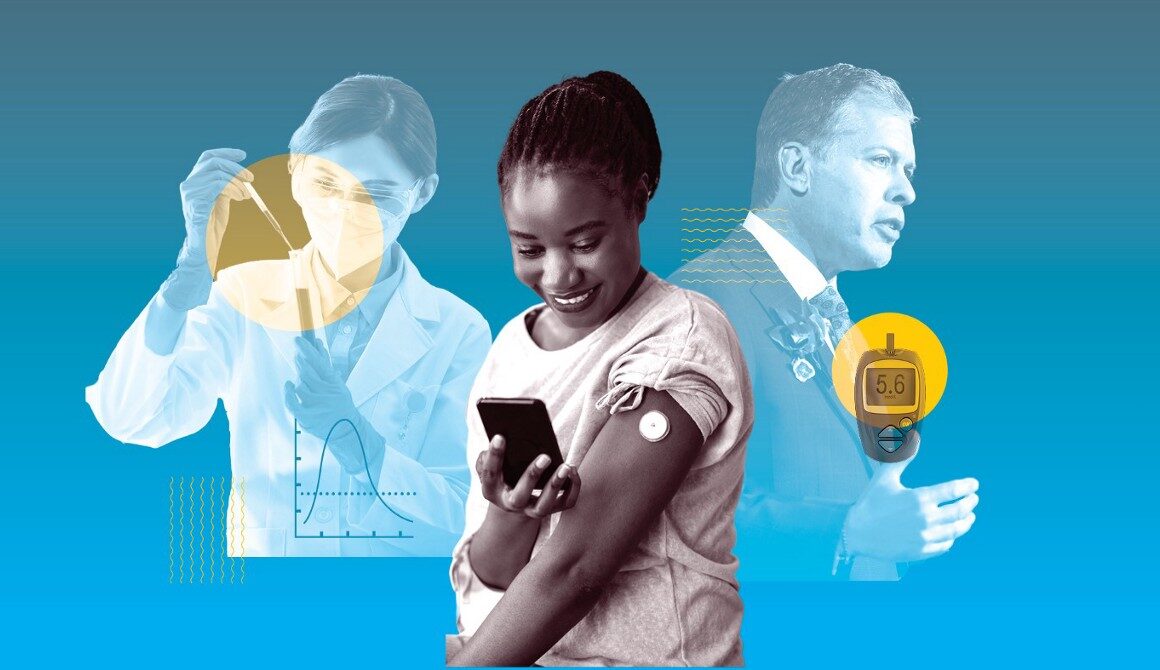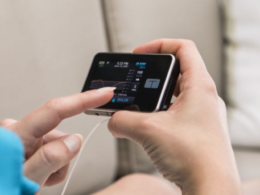To be clear, our 10-year vision isn’t to declare a cure.
Startup Health
June 16, 2022
Key messages
by Joaquim Cardoso MSc
Health Transformation — Institutes
Institutes for “better health, better care and lower costs, for all”.
June 18, 2022
What is the problem?
In 1922, a 14-year-old boy named Leonard Thompson received the world’s first injection of insulin to treat type 1 diabetes (T1D).
In the hundred years since this discovery, we’ve seen
- the invention of glucose monitors, which allowed people with diabetes to draw and test their blood,
- and then manage their glucose levels with shots of insulin from home.
- We then saw the advent of continuous glucose monitors (CGMs) which automate the blood testing process and beam glucose numbers to your smartphone.
A cure has not yet been found, and today 20 million people around the globe face the challenges, frustrations, and expenses of type 1 diabetes.
What are the causes?
- Progress is still slow. One big reason? A lack of coordination and collaboration between major stakeholders.
- In academy, you can come up with some great ideas, but it often takes a lot of people to get a clinical trial done
- When we look across the verticals of industry, government, foundations and investors we see isolated efforts and siloed progress.
What is the solution?
We need A New, Collaborative Model for Fighting Type 1 Diabetes
- It’s time for a different model, one that goes deep on impact by creating a uniquely collaborative environment.
- We need to complement the extraordinary R&D efforts taking place with a focus on entrepreneurial innovation that brings new solutions to market and opens up global access to care.
What is the approach of the new initiative?
- StartUp Health and a consortium of diabetes leaders launch the first dedicated moonshot to prevent, manage, and cure type 1 diabetes, …
- … rallying once-siloed entrepreneurs, investors, foundations, industry, and academics.
- The cross-disciplinary team includes leaders from the Helmsley Trust, Yale University, Eli Lilly, JDRF’s T1D Fund, and the Diabetes Research Institute.
What is the vision?
- To be clear, our 10-year vision isn’t to declare a cure.
Structure of the publication
- Introduction — A Historical perspective of Diabetes Achievements
- A New, Collaborative Model for Fighting Type 1 Diabetes
- Building on a Decade of Health Moonshot Investing

In 1922, a 14-year-old boy named Leonard Thompson received the world’s first injection of insulin to treat type 1 diabetes (T1D).
It saved his life, and that year the Toronto Daily Star ran a full-width banner headline that read “Toronto Doctors On Track Of Diabetes Cure.”
The discovery, which earned its inventors the Nobel Prize in Medicine, turned a fatal auto-immune disease into a condition which, with daily care and treatment, could be managed.
In the hundred years since this discovery, we’ve seen …
… the invention of glucose monitors, which allowed people with diabetes to draw and test their blood, and then manage their glucose levels with shots of insulin from home. We then saw the advent of continuous glucose monitors (CGMs) which automate the blood testing process and beam glucose numbers to your smartphone.
And yet, even with these advances, the optimism of the century-old Toronto Daily Star headline rings a bit hollow.
A cure has not yet been found, and today 20 million people around the globe face the challenges, frustrations, and expenses of type 1 diabetes. Parents of children with type 1 fear sending their child to summer camp without a trained nurse on staff. Adults with type 1 bear the daily stress of managing their blood sugars while coping with their professions, families, and lives — all to avoid the endless medical complications associated with diabetes.
“Even with monitoring and insulin, my life is going to be shortened,” says Derek Devine a 35-year-old New Yorker with type 1 diabetes. “There will be long-term health ramifications, which is why I have to go to the dentist, get my eyes checked and my feet examined.” Devine, who is a father of three, is both excited by recent developments (like news of a pancreas transplant) and also wary of more diabetes “gizmos.”
In other words, we’ve come so far, yet there is still much work to do. Not that scientists and foundations haven’t been trying.
There has been exciting research into Anti-CD3 therapies that could delay the onset of diabetes in children.
Nonprofits like the Diabetes Research Institute Foundation and JDRF have raised hundreds of millions of dollars to fund T1D research all over the world.
Yet progress is still slow. One big reason? A lack of coordination and collaboration between major stakeholders.
“As academics, you can come up with some great ideas, but it often takes a lot of people to get a clinical trial done,” says Jennifer Sherr, MD, PhD, a pediatric endocrinologist from Yale who has joined the Type 1 Diabetes Moonshot Impact Board.
“We are constantly writing grants to test new things, but you can only get a limited pool of funds to support that endeavor. Then you look at just the sheer number of years it takes to complete research. Researchers can know what they think will happen, but they might not have the funds to make it occur faster.”
Academia isn’t alone.
When we look across the verticals of industry, government, foundations and investors we see isolated efforts and siloed progress.
It’s time for a different model, one that goes deep on impact by creating a uniquely collaborative environment.
We need to complement the extraordinary R&D efforts taking place with a focus on entrepreneurial innovation that brings new solutions to market and opens up global access to care.

A New, Collaborative Model for Fighting Type 1 Diabetes
In order to address systemic challenges in finding type 1 diabetes treatments, StartUp Health has launched a dedicated T1D Moonshot designed to speed up progress.
At the heart of this effort is a plan for breaking down silos between research and development and commercialization.
For too long the forces and funds needed to address the greatest health challenges of our time have been separated.
Our first step in this mission is to form a unique T1D Moonshot Impact Board that brings together renowned representatives from the worlds of investment, business, academia and foundations.
There is amazing research being done at the world’s top institutions, but it needs to be translated into products and services that change people’s lives.
There are passionate funders from world-class non-profits, but they need to be linked with companies and founders who have the grit to succeed in a competitive marketplace.
This growing impact board will be empowered to make those connections and speed up innovation.
Leading the Type 1 Diabetes Moonshot Impact Board as Chief Impact Officer is David Weingard, a serial entrepreneur and type 1 patient who has been advocating for diabetes care for decades.
He founded the StartUp Health-backed company Cecelia Health (formerly Fit4D), which connects people with diabetes with a certified diabetes clinician.
For his work innovating and advocating in this space, Weingard was recently named the Dare to Dream Honoree by the Diabetes Research Institute Foundation.
“We are in a crisis given the exponential growth of diabetes and the human and economic cost to society,” said Weingard.
“With the launch of the Type 1 Diabetes Moonshot, StartUp Health will be accelerating global innovation with a focused collaborative innovation model designed to speed up progress.
Creative and effective solutions developed across academia, nonprofit, and commercial environments will be collectively nurtured in scale to accelerate impact. The T1D Moonshot will be built on a level of collaboration that the world hasn’t seen before.”
Another impact board member and passionate early partner of the T1D Moonshot is David Panzirer, Trustee for The Leona M. and Harry B. Helmsley Charitable Trust.
Panzirer has multiple family members with type 1 diabetes and has dedicated his life to improving management and outcomes for people with this condition. Through its Type 1 Diabetes Program, since 2009 Helmsley has invested nearly $1B to better understand, diagnose, and treat type 1. And yet, Panzirer is the first to note that obstacles to access still persist.
“Most prescriptions for continuous glucose monitors are written out of diabetes specialty clinics, and all of these clinics are associated with major cities or academic centers,” says Panzirer.
“So if you live in rural America, you’re not getting these devices. The large majority of people living with type 1 diabetes aren’t even seeing an endocrinologist. In today’s telemedicine world, that’s just not okay. We have to do better.”
When asked why it was important to collaborate with startups — not just academics and non-profits — on the T1D Moonshot, Panzirer’s answer was emphatic: “Entrepreneurs are the missing piece.”
“Most prescriptions for continuous glucose monitors are written out of diabetes specialty clinics, and all of these clinics are associated with major cities or academic centers,” says Panzirer.
“So if you live in rural America, you’re not getting these devices.
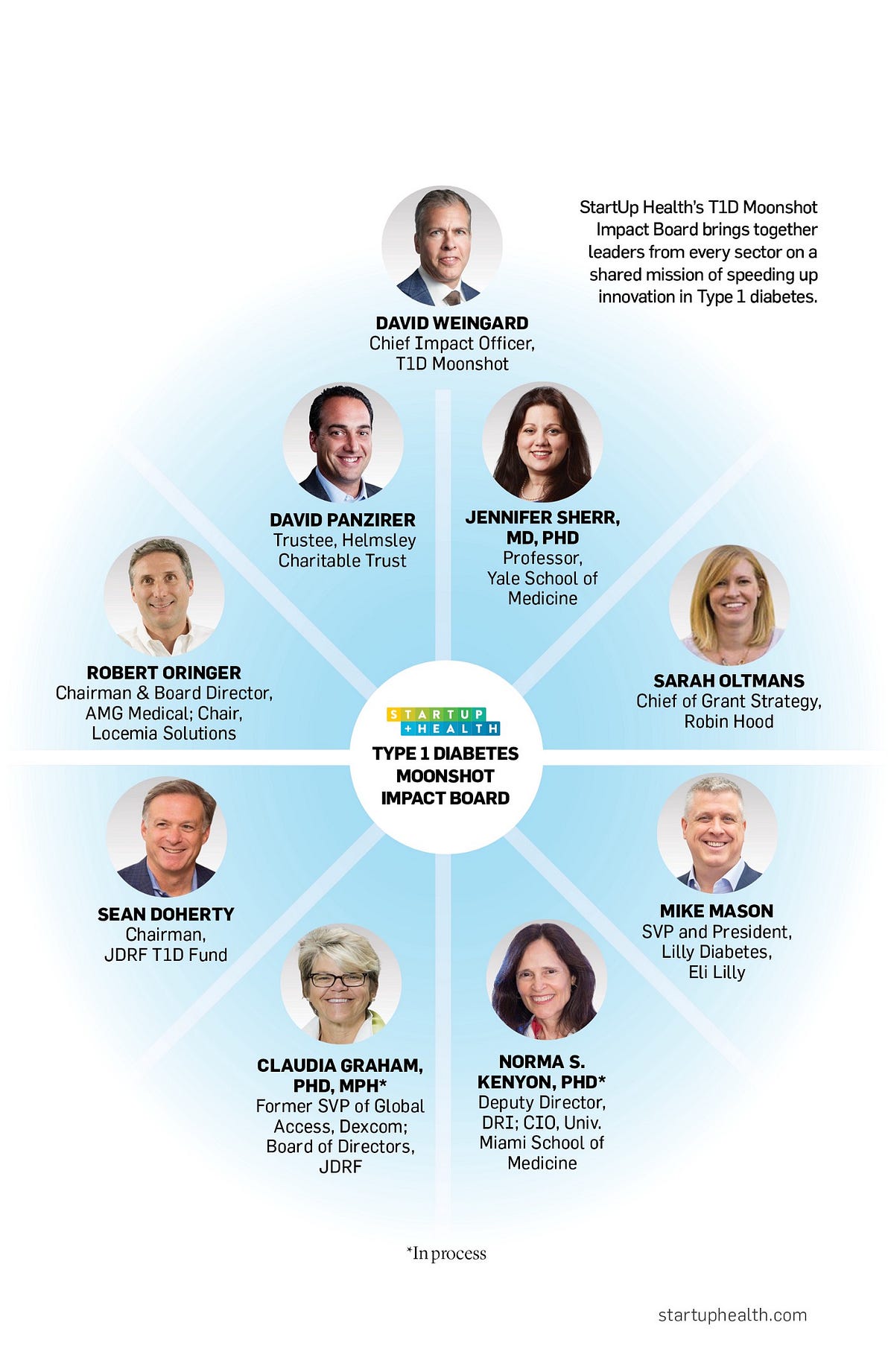
Sean Doherty, Chairman of the JDRF T1D Fund, brings deep funding expertise to the Type 1 Diabetes Moonshot Impact Board having catlyzed T1D venture capital since 2016.
“We in the T1D community have very high confidence in the science behind T1D cure programs,” says Doherty, who was previously a managing director at Bain Capital. “Now is the time for us to convince the commercial markets that there’s a business case to finally make scale investments in curative therapies.”
Representing academic diabetes research on the impact board is Jennifer Sherr, MD, PhD, a pediatric endocrinologist from Yale. Diagnosed with type 1 in 1987, Dr. Sherr has been on a mission ever since to discover new treatments. But her work has been slowed by a lack of collaboration outside academia.
“We need an intersection where savvy business individuals can help us better understand how to move things forward,” says Dr. Sherr. “That’s going to make it so much faster and impact so many lives.”
Mike Mason comes to the T1D Moonshot Impact Board from Ely Lilly where he is the President of Lilly Diabetes. Like Panzirer and Sherr, T1D has hit Mason’s family personally, driving him to find solutions.
“Only one in three people who live with type 1 diabetes are currently in good glycemic control,” says Mason. “For those who care deeply about the health of people living with diabetes, we have to passionately strive for better solutions. The T1D Moonshot is a bold approach to bring real solutions to those living with Diabetes.”
Robert Oringer joins the impact board from AMG Medical where he is the Chairman and Board Director. At AMG Oringer leads efforts to evaluate innovative diabetes technologies. Sarah Oltmans, who is the Chief of Grant Strategy from Robin Hood, will help the impact board keep a focus on opening up access to diabetes care in underserved communities. In her role at Robin Hood, Oltmans manages the strategic vision behind the distribution of $150M in grants annually to help New Yorkers find permanent pathways out of poverty.
“Diabetes impacts millions of lives, with an accelerating diagnosis rate,” said Steven Krein, CEO and Co-founder of StartUp Health. “By collaborating as a networked community, we can accelerate the commercial development and availability of effective solutions so that we can change the face of diabetes forever.”
“It’s time for a new era in the fight against diabetes,” says Unity Stoakes, President and Co-founder of StartUp Health. “It’s time to combine the energy of hundreds — even thousands — of passionate entrepreneurs with the world’s top investors and institutions.”
Building on a Decade of Health Moonshot Investing
The Type 1 Diabetes Moonshot builds on a framework for speeding up innovation that StartUp Health has been using for most of a decade. Every quarter, StartUp Health invests in a large, diversified portfolio of seed and early-stage startups from all over the world — like Cecelia Health with their high-tech, high-touch approach to T1D diabetes coaching. We unite the founders with a trusted global peer community and with programs and tools to help them “level up” through every stage of growth. We enable founders to continually reach a global audience at every stage using a powerful combination of brand media, events and marketing. We provide access to a growing global network of community-driven and curated relationships with investors, customers, partners, and press.
While the first decade of StartUp Health focused on broad health moonshot themes like Access to Care and Women’s Health, the Type 1 Diabetes Moonshot is the first in a new series of health moonshots designed to go deep on a specific objective. By creating first-of-their-kind impact boards and lowering the barriers between entrepreneurs, investors, foundations and academia, we believe we can speed up progress while also earning healthy returns in line with our historical fund performance.
“For nearly a decade StartUp Health has laid the groundwork for this TID Moonshot, supporting scores of entrepreneurs in the fight against chronic disease,” says Stoakes. “Now it’s time to take that mission to the next level with organized support and global partners committed to bringing the next generation of diabetes solutions to the world.”
To be clear, our 10-year vision isn’t to declare a cure. We’ve seen enough over-promising in the cure department, all the way back to that headline in 1922. Instead, we want to ensure that everyone with type 1 diabetes has the tools and resources necessary to thrive. We also want to get to a place where we can prevent and delay the onset of type 1 diabetes. These are audacious goals in themselves, and will take a kind of collaboration and investment that we haven’t seen in this sector yet.
The launch of StartUp Health’s Type 1 Diabetes Moonshot is a call for partnership. Entrepreneurs who are innovating in the type 1 diabetes ecosystem are encouraged to apply at startuphealth.com and join the firm’s global army of more than 1,000 Health Transformers working to achieve health moonshots. If you’re an entrepreneur who believes that we need to leverage collaboration and moonshot thinking to deliver quality care to everyone in the world regardless of location or income, we want to meet you.
This launch is also an invitation to investors and partners. If you believe in a collaborative, global approach to fighting T1D, and if you believe we are stronger together, as an army of innovators and investors with a single health moonshot objective, we want to partner.
Investors and partners interested in collaborating on StartUp Health’s Type 1 Diabetes Moonshot can email us at T1D@startuphealth.com.
Investors: Learn how you can invest in Health Moonshots through the StartUp Health Moonshots Impact Fund.
Digital health entrepreneur? Don’t make the journey alone. Learn more about the StartUp Health Community and how StartUp Health invests.
Sign up for StartUp Health Insider™ to get funding insights, news, and special updates delivered to your inbox.
Follow us on social media for daily updates on Health Transformers: Twitter, LinkedIn, Facebook, and Instagram.
And yet, even with these advances, the optimism of the century-old Toronto Daily Star headline rings a bit hollow.
A cure has not yet been found, and today 20 million people around the globe face the challenges, frustrations, and expenses of type 1 diabetes.
Parents of children with type 1 fear sending their child to summer camp without a trained nurse on staff. Adults with type 1 bear the daily stress of managing their blood sugars while coping with their professions, families, and lives — all to avoid the endless medical complications associated with diabetes.
“Even with monitoring and insulin, my life is going to be shortened,” says Derek Devine a 35-year-old New Yorker with type 1 diabetes. “There will be long-term health ramifications, which is why I have to go to the dentist, get my eyes checked and my feet examined.” Devine, who is a father of three, is both excited by recent developments (like news of a pancreas transplant) and also wary of more diabetes “gizmos.”
A cure has not yet been found, and today 20 million people around the globe face the challenges, frustrations, and expenses of type 1 diabetes.
In other words, we’ve come so far, yet there is still much work to do. Not that scientists and foundations haven’t been trying.
There has been exciting research into Anti-CD3 therapies that could delay the onset of diabetes in children.
Nonprofits like the Diabetes Research Institute Foundation and JDRF have raised hundreds of millions of dollars to fund T1D research all over the world.
Yet progress is still slow. One big reason? A lack of coordination and collaboration between major stakeholders.
In other words, we’ve come so far, yet there is still much work to do. Not that scientists and foundations haven’t been trying.
Yet progress is still slow.One big reason? A lack of coordination and collaboration between major stakeholders.
“As academics, you can come up with some great ideas, but it often takes a lot of people to get a clinical trial done,” says Jennifer Sherr, MD, PhD, a pediatric endocrinologist from Yale who has joined the Type 1 Diabetes Moonshot Impact Board.
“We are constantly writing grants to test new things, but you can only get a limited pool of funds to support that endeavor. Then you look at just the sheer number of years it takes to complete research. Researchers can know what they think will happen, but they might not have the funds to make it occur faster.”

Academia isn’t alone.
When we look across the verticals of industry, government, foundations and investors we see isolated efforts and siloed progress.
It’s time for a different model, one that goes deep on impact by creating a uniquely collaborative environment.
We need to complement the extraordinary R&D efforts taking place with a focus on entrepreneurial innovation that brings new solutions to market and opens up global access to care.
Academia isn’t alone. When we look across the verticals of industry, government, foundations and investors we see isolated efforts and siloed progress.
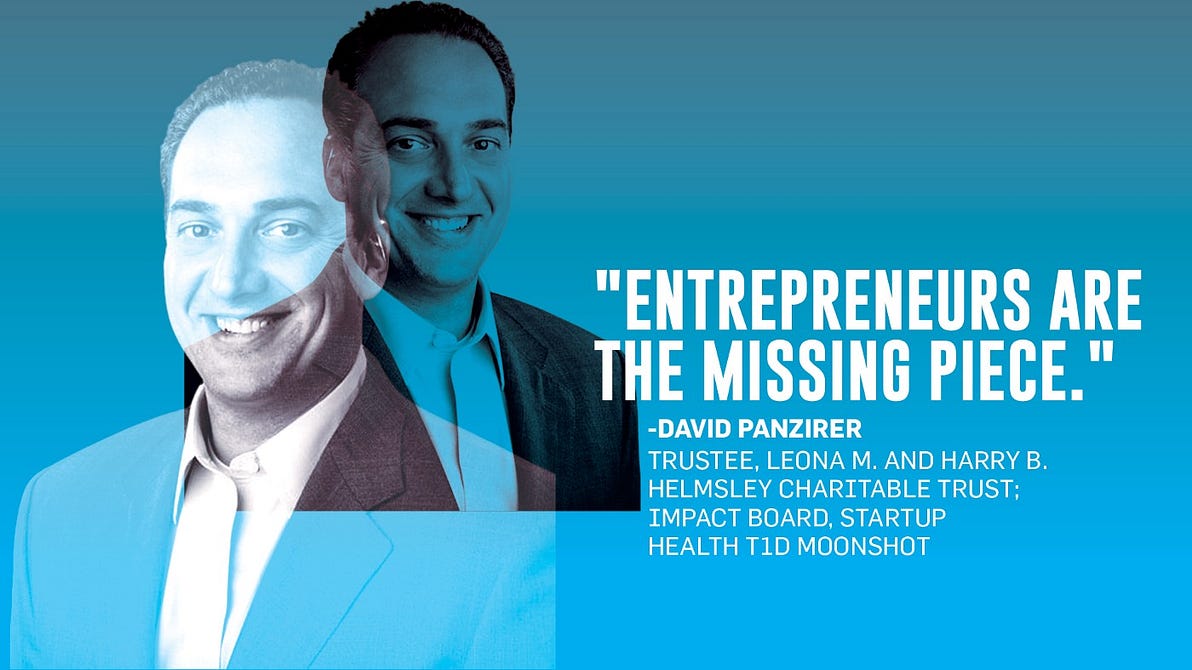
A New, Collaborative Model for Fighting Type 1 Diabetes
In order to address systemic challenges in finding type 1 diabetes treatments, StartUp Health has launched a dedicated T1D Moonshot designed to speed up progress.
At the heart of this effort is a plan for breaking down silos between research and development and commercialization. For too long the forces and funds needed to address the greatest health challenges of our time have been separated.
Our first step in this mission is to form a unique T1D Moonshot Impact Board that brings together renowned representatives from the worlds of investment, business, academia and foundations.
There is amazing research being done at the world’s top institutions, but it needs to be translated into products and services that change people’s lives. There are passionate funders from world-class non-profits, but they need to be linked with companies and founders who have the grit to succeed in a competitive marketplace. This growing impact board will be empowered to make those connections and speed up innovation.
Leading the Type 1 Diabetes Moonshot Impact Board as Chief Impact Officer is David Weingard, a serial entrepreneur and type 1 patient who has been advocating for diabetes care for decades.
He founded the StartUp Health-backed company Cecelia Health (formerly Fit4D), which connects people with diabetes with a certified diabetes clinician. For his work innovating and advocating in this space, Weingard was recently named the Dare to Dream Honoree by the Diabetes Research Institute Foundation.
“We are in a crisis given the exponential growth of diabetes and the human and economic cost to society,” said Weingard.
“With the launch of the Type 1 Diabetes Moonshot, StartUp Health will be accelerating global innovation with a focused collaborative innovation model designed to speed up progress.
Creative and effective solutions developed across academia, nonprofit, and commercial environments will be collectively nurtured in scale to accelerate impact. The T1D Moonshot will be built on a level of collaboration that the world hasn’t seen before.”
Another impact board member and passionate early partner of the T1D Moonshot is David Panzirer, Trustee for The Leona M. and Harry B. Helmsley Charitable Trust.
Panzirer has multiple family members with type 1 diabetes and has dedicated his life to improving management and outcomes for people with this condition.
Through its Type 1 Diabetes Program, since 2009 Helmsley has invested nearly $1B to better understand, diagnose, and treat type 1.
And yet, Panzirer is the first to note that obstacles to access still persist.
“Most prescriptions for continuous glucose monitors are written out of diabetes specialty clinics, and all of these clinics are associated with major cities or academic centers,” says Panzirer.
“So if you live in rural America, you’re not getting these devices. The large majority of people living with type 1 diabetes aren’t even seeing an endocrinologist. In today’s telemedicine world, that’s just not okay. We have to do better.”
When asked why it was important to collaborate with startups — not just academics and non-profits — on the T1D Moonshot, Panzirer’s answer was emphatic: “Entrepreneurs are the missing piece.”
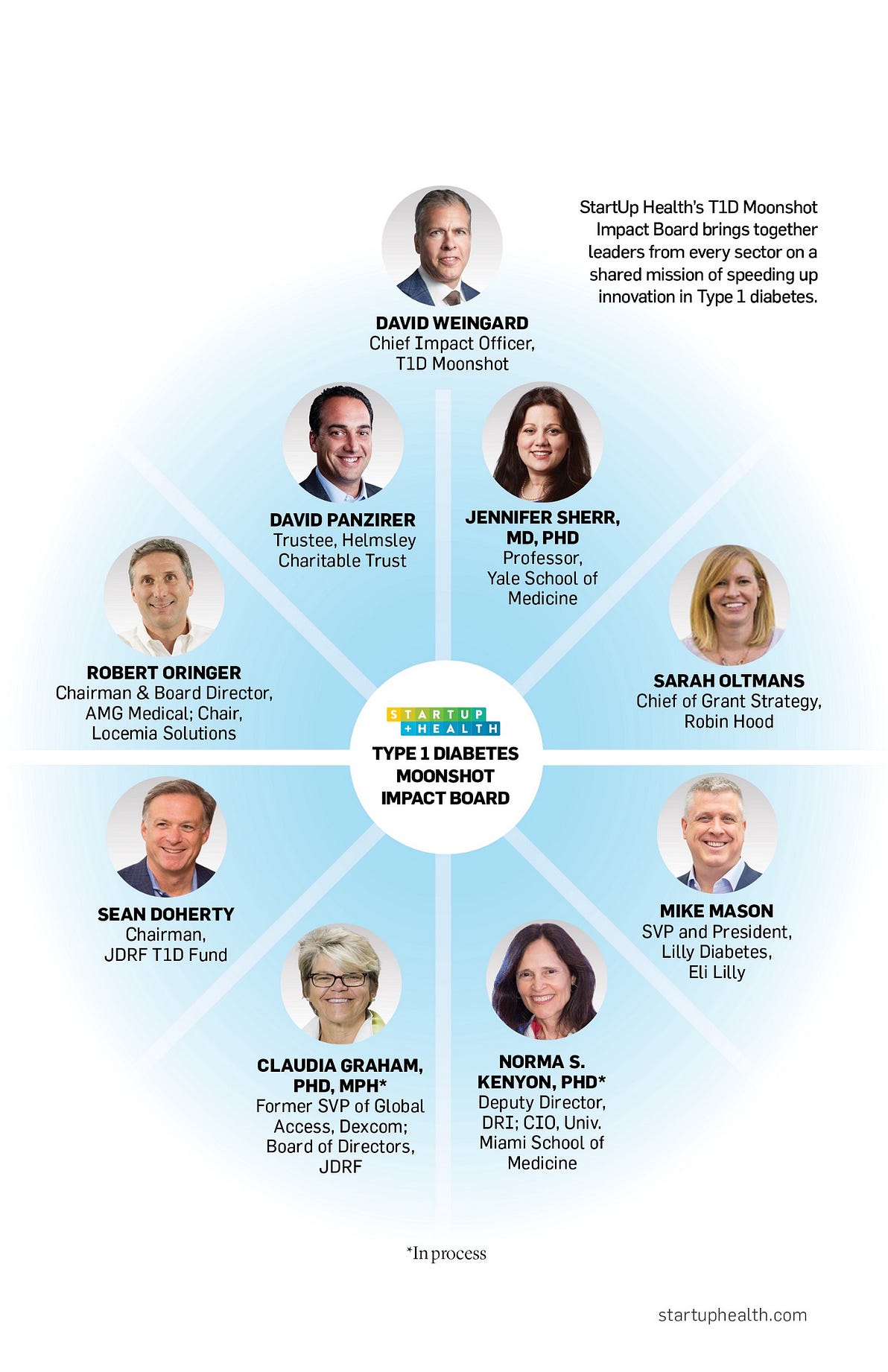
Sean Doherty, Chairman of the JDRF T1D Fund, brings deep funding expertise to the Type 1 Diabetes Moonshot Impact Board having catalyzed T1D venture capital since 2016.
“We in the T1D community have very high confidence in the science behind T1D cure programs,” says Doherty, who was previously a managing director at Bain Capital.
“Now is the time for us to convince the commercial markets that there’s a business case to finally make scale investments in curative therapies.”
Representing academic diabetes research on the impact board is Jennifer Sherr, MD, PhD, a pediatric endocrinologist from Yale.
Diagnosed with type 1 in 1987, Dr. Sherr has been on a mission ever since to discover new treatments. But her work has been slowed by a lack of collaboration outside academia.
“We need an intersection where savvy business individuals can help us better understand how to move things forward,” says Dr. Sherr. “That’s going to make it so much faster and impact so many lives.”
Mike Mason comes to the T1D Moonshot Impact Board from Ely Lilly where he is the President of Lilly Diabetes. Like Panzirer and Sherr, T1D has hit Mason’s family personally, driving him to find solutions.
“Only one in three people who live with type 1 diabetes are currently in good glycemic control,” says Mason.
“For those who care deeply about the health of people living with diabetes, we have to passionately strive for better solutions. The T1D Moonshot is a bold approach to bring real solutions to those living with Diabetes.”
Robert Oringer joins the impact board from AMG Medical where he is the Chairman and Board Director.
At AMG Oringer leads efforts to evaluate innovative diabetes technologies. Sarah Oltmans, who is the Chief of Grant Strategy from Robin Hood, will help the impact board keep a focus on opening up access to diabetes care in underserved communities.
In her role at Robin Hood, Oltmans manages the strategic vision behind the distribution of $150M in grants annually to help New Yorkers find permanent pathways out of poverty.
“Diabetes impacts millions of lives, with an accelerating diagnosis rate,” said Steven Krein, CEO and Co-founder of StartUp Health. “By collaborating as a networked community, we can accelerate the commercial development and availability of effective solutions so that we can change the face of diabetes forever.”
“It’s time for a new era in the fight against diabetes,” says Unity Stoakes, President and Co-founder of StartUp Health. “It’s time to combine the energy of hundreds — even thousands — of passionate entrepreneurs with the world’s top investors and institutions.”

Building on a Decade of Health Moonshot Investing
The Type 1 Diabetes Moonshot builds on a framework for speeding up innovation that StartUp Health has been using for most of a decade.
Every quarter, StartUp Health invests in a large, diversified portfolio of seed and early-stage startups from all over the world — like Cecelia Health with their high-tech, high-touch approach to T1D diabetes coaching.
We unite the founders with a trusted global peer community and with programs and tools to help them “level up” through every stage of growth. We enable founders to continually reach a global audience at every stage using a powerful combination of brand media, events and marketing. We provide access to a growing global network of community-driven and curated relationships with investors, customers, partners, and press.
While the first decade of StartUp Health focused on broad health moonshot themes like Access to Care and Women’s Health, …
… the Type 1 Diabetes Moonshot is the first in a new series of health moonshots designed to go deep on a specific objective.
By creating first-of-their-kind impact boards and lowering the barriers between entrepreneurs, investors, foundations and academia, we believe we can speed up progress while also earning healthy returns in line with our historical fund performance.
“For nearly a decade StartUp Health has laid the groundwork for this TID Moonshot, supporting scores of entrepreneurs in the fight against chronic disease,” says Stoakes.
“Now it’s time to take that mission to the next level with organized support and global partners committed to bringing the next generation of diabetes solutions to the world.”
To be clear, our 10-year vision isn’t to declare a cure.
We’ve seen enough over-promising in the cure department, all the way back to that headline in 1922.
Instead, we want to ensure that everyone with type 1 diabetes has the tools and resources necessary to thrive.
We also want to get to a place where we can prevent and delay the onset of type 1 diabetes.
These are audacious goals in themselves, and will take a kind of collaboration and investment that we haven’t seen in this sector yet.
To be clear, our 10-year vision isn’t to declare a cure.
The launch of StartUp Health’s Type 1 Diabetes Moonshot is a call for partnership.
Entrepreneurs who are innovating in the type 1 diabetes ecosystem are encouraged to apply at startuphealth.com and join the firm’s global army of more than 1,000 Health Transformers working to achieve health moonshots.
If you’re an entrepreneur who believes that we need to leverage collaboration and moonshot thinking to deliver quality care to everyone in the world regardless of location or income, we want to meet you.
If you’re an entrepreneur who believes that we need to leverage collaboration and moonshot thinking to deliver quality care to everyone in the world regardless of location or income, we want to meet you.
This launch is also an invitation to investors and partners.
If you believe in a collaborative, global approach to fighting T1D, and if you believe we are stronger together, as an army of innovators and investors with a single health moonshot objective, we want to partner.
Originally published at https://healthtransformer.co on June 16, 2022.
Names mentioned
Jennifer Sherr, MD, PhD, a pediatric endocrinologist from Yale who has joined the Type 1 Diabetes Moonshot Impact Board.
Chief Impact Officer is David Weingard,
David Panzirer, Trustee for The Leona M. and Harry B. Helmsley Charitable Trust.
Sean Doherty, Chairman of the JDRF T1D Fund
Jennifer Sherr, MD, PhD, a pediatric endocrinologist from Yale.
Mike Mason comes to the T1D Moonshot Impact Board from Ely Lilly
Robert Oringer joins the impact board from AMG Medical where he is the Chairman and Board Director.
Diabetes Research Institute Foundation.
Mike Mason comes to the T1D Moonshot Impact Board from Ely Lilly where he is the President of Lilly Diabetes




